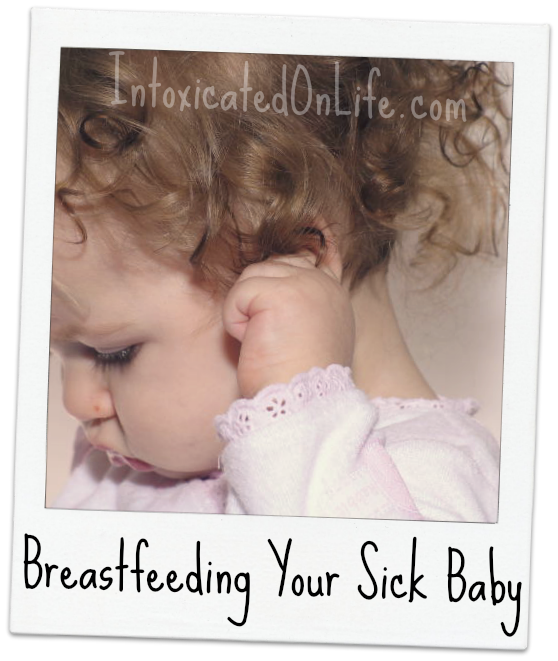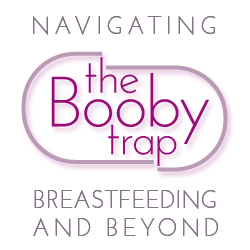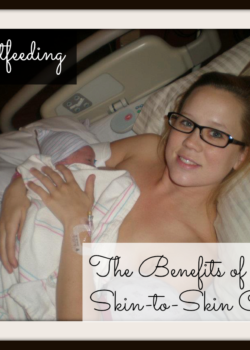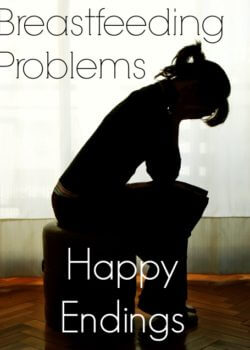 Breastfeeding a sick baby or child can be one of the most comforting and yet one of the most distressing things for a mother and baby.
Breastfeeding a sick baby or child can be one of the most comforting and yet one of the most distressing things for a mother and baby.
Breasts are not beakers with a side view to show volume and little bellies aren’t a one-size-fits-all. Hospitals love exact measurements, and one thing that’s hard to measure is how much milk your babe gets “straight from the tap.”
Then add in the personal opinions of others who disagree with the idea…and you wonder if you should or shouldn’t nurse a sick kiddo. The breastfeeding experts say yes you should—with the exception of rare metabolic disorders. Breastfeeding offers health and healing benefits you can get no where else.
Colds and Stuffy Noses
A stuffy nose means it’s harder to breathe when lying down to nurse. A simple fix…
- Nurse your babe sitting up. This allows congestion to drain, keeping an open airway.
- Breast milk contains antibodies. Express a few drops of breast milk into your baby’s nose, and if your baby’s nose is stuffy, wait a wee bit and then use a bulb syringe to remove it. I would recommend adding a drop of breast milk to the kids’ nose and eyes once a week to keep them healthy. Since you want your baby to have these healthy antibodies, don’t remove the few drops from a healthy nose.
- Be sure to offer the breast hourly to encourage nursing as many little one’s will nurse for a short time since it’s hard to breathe.
Vomiting and Diarrhea
Breast milk is very easily absorbed, so by offering small amounts frequently (take them off the breast after they take just a bit of milk) the milk will stay down easier and will keep baby hydrated. It’s rare for an exclusively breastfed baby to become dehydrated as the milk is so easily absorbed.
However be sure to pay attention to stool and urine. Foul odor, looser than normal stool, or more than average was always the sign the kids were starting to have a belly issue. If you don’t check out your kids’ poop, you should. It, like urine, is one of the first areas to advertise something is out of wack.
Teething and Mouth Trauma
Teething hurts. Pressure on the gums can exasperate that. So what do you do when it appears your kiddo’s on a nursing strike?
Offer the breast when they’re asleep. This trick always helped me.
Don’t give up, use your pump (my favorite is the Medela Pump In Style) to keep your supply up, use that milk and offer it in a cup or syringe. You can even finger-feed or create milkcicles, ice cream, yogurt so your little one is still getting all the health benefits.
Freezing milk will also help numb their gums alleviating the pain. I found I could offer the breast after they ate the ice cream and they would tend to fall off to sleep too.
Hospitalization
Sometimes you must breastfeed in the hospital. Breastfeeding in the NICU or pediatric wing of the hospital can be very stressful. Breastfeeding doesn’t allow for the detailed documentation that doctors and nurses need. You can’t see how much was in the breast nor how much the baby now has in their belly.
To help with that need to document:
- Request a scale that can handle grams.
- Weigh the baby before you nurse and after you nurse.
- Put a fresh diaper on beforehand and don’t change it until AFTER you’ve had the second weighing even if they pee or poo.
While you’re not weighing fluid ounces you are seeing how much is going in by weight. This number will be different when compared to fluid ounces. You can pump and weigh it to see the comparison.
Also, don’t be fearful if you’re only able to express a small amount. A breast pump is a poor mimic for what a baby can do. You’ve more to way more milk than you’re seeing, especially if you don’t pump or never have.
Breastfeeding a Sick Baby Promotes Healing
Breast milk is the perfect food for your baby. It is different in a mother with a preemie vs. the mother of a full term infant. Your body passes antibodies, through the milk, to your baby based on the infections within the environment and also what you or the baby have or have been exposed to.
Ever noticed you were sick but the baby didn’t get sick? That’s antibodies in action keeping your breastfed baby healthy. The antibodies are not rendered ineffective if they go through a bottle or cup. So if you’re uncomfortable with nursing or you work, pumping will still give your baby those same benefits.








Leave a Comment